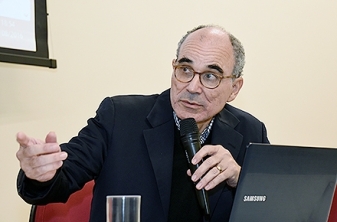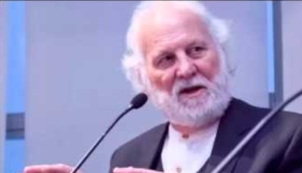

Amnéris Maroni
In an interview for Revista Percurso (1998), Christopher Bollas presents us an interesting political debate within psychoanalysis: a war among the schools that assume pure minds, non-contaminated minds, and that is, from the author’s perspective, one of the features typical of a fascist mind. That war would also nullify one of the basic elements in the profession of an analyst, that is, an individual analysis, for one of the assumptions in the analysis is to win the possibility of being oneself. In that case, how could one justifies such primary identifications with a school, an author, a single perspective? As a result, a strange paradox came up: the psychoanalysis, which pretends to be not so fond of politics, has invited into its innermost chambers a very compromising political struggle.
This discussion proposed by Bollas interests me, but I’d like to reframe it, not from a political viewpoint, but from an anthropological one, more specifically yet, from the new anthropology standpoint. Currently, this discipline prefers to work with ontological terms—what have been so far thought of in terms of culture and cosmology. It would rather focus on the ontological conflicts, and with them, multiple modes of existence come up. Eduardo Viveiros de Castro makes clear that, at certain point in his trajectory, he became aware of the fact that anthropology did had something to offer for the leftist critical revision of the Western world: the radicalism of alterity (Castro, 2012). If it is true that since Jean-Jacques Rousseau the issue of alterity is the main anthropological issue, at the end of the 20th century and beginning of the 21st century, due to the Globalization phenomenon, there has been a resignification, once more, of the issue of “production” of alterities, providing it with an unequivocal political content. This vast field of diversities didn’t flourish, however, without many anthropologists’ persistent work, together with “thousands of interpretative communities” (Santos, 2005). Therefore, it’s understandable the relevance of this discipline of the ontologies and of the ontological conflicts.
The issue of anthropology is the issue of the other: the other from faraway lands, who has long been call “primitive”, “wild”; the other-rural, the other-woman, the other-gay, the other-trans, the other-megalopolis-citizen. Others-collectives, differently announced. Nevertheless, it isn’t only the anthropology which dedicate itself to the study of the other. The issue of psychoanalysis is also the other: the other-individual, but also the other-group, the other-collective. To my thinking, anthropology and psychoanalysis are sister disciplines—although they focus on the other from different perspectives. In order to understand that other-individual, a countless range of psychoanalytical schools have blossomed: Freudian, Jungian, Reichian, Lacanian, Kleinian, Winnicottian, Bionian, just to mention the major ones. Together with those schools, a network of big formation center, which defend their axioms, have appeared around the world. Each school, jealous of its truth, started to denigrate the others.
Before getting in touch with Bollas, I developed the perspectivism, with the help of Friedrich Nietzsche and William James, so that I could try to understand the reason of so many schools: each one of them would bring up a possible perspective in apprehending the psyche; the base of these perspectives would be the instincts of the founding father of each psychoanalysis school. Freud would advance in his theory the sexual instinct, Adler, the power instinct, Jung, multiple instincts; each one of those major forerunners composed a true expression, a partial truth, turning them into psychological theories. Thus, it would be possible to design democratic epistemologies, and they would be able to engage in a peaceful coexistence. However, with the exception of Bollas and very few others, those schools don’t show the supposed interest in democratic epistemologies. Conversely, the “war among schools” has given rise and solidify another issue: the idea of “application of psychoanalysis”, whether it is in the analytical setting, whether it is in the arts, literature, etc. I’m not going to discuss this issue here, but surely “applying psychoanalysis”—to apply the theory—is one of the key points present in the modern western epistemology.
Having understood the limits of perspectivism, I reframe my question: wouldn’t it be better to approach the war among schools, that Bollas reads with political lenses, as ontological conflicts?
Recently, many anthropologists have started to conceive of the ontologies as “collections of assumptions on what exists”. This definition was suggested in an article by Mauro Almeida (2013). The “pragmatic encounters” do not exist, as such, for the anthropologist, as could assume a neo-positivist, for they’re always indebted to an ontology. Put differently, the ontology give sense, or allow the interpretation of pragmatic encounters—and go beyond any particular encounter, independently of its number. Mauro de Almeida provides enticing examples of multiple and incompatible ontologies, but ones that coexist, as well as examples of ontologies that destroy one another in the Amazon forest.
Also in psychoanalysis we don’t have “pragmatic encounters”, tout court, but we have “pragmatic encounters” whose meaning is given by the several ontologies to which those encounter belong. A Jungian analyst and his analysand can establish a “pragmatic encounter”, starting from a “set of presuppositions on what exists”, departing from an ontology, which differs from the pragmatic double that make up the presuppositions of the Lacanian ontology. Or else, the presuppositions which inform the Winnicottian ontology and the “pragmatic encounters” between the double of analyst and analysand are very different from those presuppositions which make up the “encounter” and the Kleinian ontology, what, by its turn, has different presuppositions in relation to the Bollasian double analyst-analysand!
Now, these ontologies aren’t closed in themselves, in isolated world; rather, these presuppositions on what exists are naturally made up by connections and transformations. Indeed, as Mauro Almeida explained, those presuppositions only become understandable during the processes of connections present in the “pragmatic encounters”. That is to say, an ontology can’t be seen and apprehended as a whole; it only reveals itself in the “pragmatic encounters”, and then, in the translation of one for the others—or not! It’s through the “pragmatic encounters” unfolding among the many analytic doubles that we can apprehend each one of the ontologies which participate in them, as well as their connections and transformations.
However, these multiple ontologies, as we’ve seen, may co-inhabit, although they may be incompatible among themselves, and the ontological conflicts there inscribed might coexist without problems, for all these ontological conflicts are part of a single modern, anthropocentric, western ontology—one that sees itself as domineering and universal.
If we understand that deeply enough, Bollas’s proposal seems to be ideal: to stop the war among schools, to study the fundamental of each one of them, and to mobilize all of them in the analytical setting. I said they look ideal if we bear in mind the Freudian field, and it isn’t ideal, but absolutely insufficient, if we have clear the multiplicity of processes of cure that take place out of that field, whether it is in or out of the West domain.
The Bollasian setting mobilizes the multiplicity of the psychoanalytical archive in order to change the “unthought known” into thinking. And I insist that such proposal is possible, although it may be quite laborious. It’s true because the ontologies, inscribed in the Freudian field, they conflict with one another, but one competitor doesn’t annihilate the other. So, the war among them is a war without cause, once they are somehow affiliated to the same modern, anthropocentric, western ontological matrix. Such ontology tries to locate the principle of individuation in the individual who’s already given, already constituted; it never asks where the individual flourishes from!
Another ontology—proposed by Gilbert Simondon (SIMONDON, 2009) is the base of contemporary thinking. There is, in it, a refusal of the already constituted individual, and of the individuated real as a starting point for the explanation of such genesis.
Simondon considers that the individuals—all of them, the table, the men, the animals, meteorological phenomena—emerge from a pre-individual stage. To be pre-individual is to be loaded with potentialities, of intensities (the difference between potentialities), to overflow from oneself. Being is excess of potentiality, of tension, of disproportion, unbridled and incoherent with oneself. It’s to disagree with oneself.
It’s impossible to think the individuals dissociated from the individuation process. Simondon thinks that the becoming is intrinsic to the being. Being is becoming/come-to-being, for it brings in itself the Apeiron—Anaximander—the unlimited which engender limited beings. That’s exactly because this fact that the relation between being and becoming implies a discrepancy of the being in relation to itself and its provisional resolution in a certain phase. So, the unlimited allows for “possible becomings”.
We’re going through an interesting and dangerous moment of a long journey, and taking the first step for an ontology which inquires the flourishing of the individuals, an ontology that think that individuals go on experiencing transitions, new blossomings, an ever-lasting burgeoning of oneself.
Undoubtedly such new Simondonian ontology doesn’t coexist peacefully with the psychoanalytical ontologies which presuppose a ready-made individual, which presuppose the anthropocentrism as natural, an unending truth inscribed in nature! Among psychoanalysis schools—each and all anthropocentric—there’s been, as I’ve already mentioned, ontological conflicts which coexists, and, at the end of the day, the war is a causeless one.
That’s very unfortunate that the psychoanalytical ontologies don’t provide any chance of coziness, of easy co-inhabitation, of coexistence with the Simondonian ontology. There are different realities in competition which are revealed by the antagonistic ontologies. Artists, writers, philosophers, they were the first ones to acknowledge and dive in this new ontology. In the contemporary clinic there are some signs of that presence, and some psychoanalyst are already trying to move towards other ontologies which don’t contemplate only the ontic register—unconscious, imagination, symbolism. Simondon’s ontology starts to inspire psychotherapists and analysts who are mobilized to understand and help their patients in their transitions—real breakthroughs—which aren’t apprehensible from an unconscious individual’s perspective, not even from the id’s perspective, but they may be apprehended starting from what the author calls pre-individual and individuation.
However, the choice of one of these ontology in detriment to the others isn’t just a matter of perspective, of preference, of personal taste, rather it has to do with an embodiment in the world, for that new ontology inscribes itself in the present time—in the “choices” of this time, its “urgencies”, its “come-into-being”.
________________
BIBLIOGRAPHY:
ALMEIDA. Mauro W. B. de. “Caipora and the other ontological conflicts”. Revista de Antropologia da UFSCAR, vol. 5, number 1, January-June, p. 7-28, 2013.
BOLLAS. Christopher. “Fascist Mind”. In: Being a Character. R.J., Revinter, 1998.
Castro. Eduardo Viveiros de. “Transformation” in anthropology, transformation of the “anthropology”. In: Mana, vol. 18, number 1. Rio de Janeiro. April/2012.
MARONI. Amnéris. Jung: Poet of the Soul. S.P. Sumus, 1998. JUNG. C. G. “The divergence between Freud and Jung”. In: Freud and the psychoanalysis. Petrópolis. Vozes. 1989.
SELAIBE. Mara. CARVALHO. Andréa. Psychoanalysis interview. S.P. Ed. Estação Liberdade, 2014. Vol. 2, p. 506-523.
SANTOS. Boaventura dos. By the hands of Alice. São Paulo, Cortês, 2005.
SIMONDON. Gilbert. “Prologo. Individuar. De cristales, esponjas y afectos” de Pablo Esteban Rodriguez . In: La Individuacion. Buenos Aires. Cebra/ Cactus, 2009 – the book is very difficult, but the prologue is indispensable.
Revista Percurso. A semiannual magazine of psychoanalysis, edited in São Paulo, by the Sedes Sapientiae Institute. Number 20/First semester 1998.
I want thank Professor Peter Pál Pelbart for the classes on Gilbert Simondon, which were given at my office.
Visit the website for Christopher Bollas
